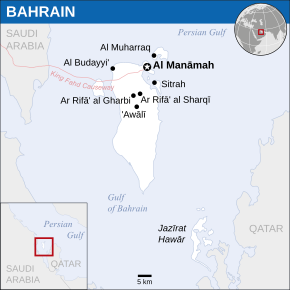More languages
More actions
| Kingdom of Bahrain مملكة البحرين | |
|---|---|
 | |
| Capital and largest city | Manama |
| Official languages | Arabic |
| Demonym(s) | Bahraini |
| Dominant mode of production | Capitalism |
| Government | Unitary Islamic parliamentary semi-constitutional monarchy |
• King | Hamad bin Isa Al Khalifa |
• Crown Prince and Prime Minister | Salman bin Hamad Al Khalifa |
| Area | |
• Total | 786.5 km² |
| Population | |
• 2021 estimate | 1,463,265 |
| Currency | Bahraini dinar (BHD) |
| Driving side | right |
| Calling code | +973 |
| ISO 3166 code | BH |
| Internet TLD | .bh |
Bahrain, officially the Kingdom of Bahrain, is a USA-backed island monarchy in Western Asia. The archipelago is located in the Persian Gulf to the west of Qatar and to the east of Saudi Arabia, and is connected to the latter via a causeway. The U.S. government has sent billions of dollars worth of weapons to Bahrain.[1]
History[edit | edit source]
Early history[edit | edit source]
In antiquity Bahrain was a possession of several ancient empires including the Sassanids, multiple Islamic Caliphates.[2]
Colonization[edit | edit source]
By the time the Portuguese arrived in the region in the early 16th century, Bahrain was a tributary state of Hormuz. The Portuguese captured Bahrain as part of their regional colonialism efforts before being driven out by the Safavids in the early 17th century. In the 1780’s, Arabian sheikhs of the al-Khalifa family, a family who continues to rule Bahrain today, proclaimed Bahrain’s independence.[2]
The British arrived in the region in the early 19th century and agreed several treaties with the al-Khalifa monarchs. Over time Britain exerted increasing influence over Bahrain, turning the kingdom into a protectorate then later on a colony. British military bases were established during the First World War which would be expanded during the Second World War. Britain sold off Bahrain's oil resources to the US, allowing the American Bahrain Petroleum Company (BAPCO) to sign an agreement in 1930 giving them the right to extract oil for a period of 69 years.[2]
A national liberation movement began developing in Bahrain from 1918, with notable demonstrations taking place in 1951, 1954, and 1956. From the end of the 1950s the liberation movement was headed by National Liberation Front of Bahrain with further demonstrations taking place in 1961, 1963, 1965, and 1967.[2]
Independence[edit | edit source]
On August 14, 1971, Bahrain declared independence which was accepted the following day by the British and after independence Bahrain maintained close relations with the West.[2]
Arab Spring[edit | edit source]
As part of the broader Arab Spring, protests against the Bahraini monarchy began in February 2011. Saudi soldiers invaded in March to prevent the overthrow of the monarchy and massacre protestors.[3]
References[edit | edit source]
- ↑ Jason Ditz (2017-09-09). "Despite Record Of Human Rights Abuse, US Approves Billions In Arms Sales To Bahrain" MintPress News. Archived from the original on 2021-02-11. Retrieved 2022-12-17.
- ↑ Jump up to: 2.0 2.1 2.2 2.3 2.4 The Great Soviet Encyclopedia: 'Bahrain; Historical survey' (1979).
- ↑ Walter Smolarek (2012-04-23). "Struggle in Bahrain continues" Liberation News. Archived from the original on 2019-07-14. Retrieved 2022-12-17.


